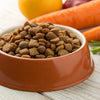What to Feed a Nursing Dog to Gain Weight: A Comprehensive Guide
- Houndsy
Table of Contents
- Introduction
- Why Does a Nursing Dog Need a Special Diet?
- Essential Nutrition for Lactating Dogs
- How Often Should a Nursing Dog Eat?
- Factors to Consider When Feeding Your Nursing Dog
- Should a Nursing Dog’s Diet Change While Weaning?
- Practical Tips to Help Your Nursing Dog Gain Weight
- Conclusion
- FAQ
Introduction
Did you know that a nursing dog's nutritional needs can increase by a staggering 25% to 600%? This incredible statistic highlights the importance of proper nutrition during this crucial stage of a dog's life. As loving pet owners, we want to ensure that our furry friends are not only healthy but also able to support their growing puppies. Understanding what to feed a nursing dog to gain weight can significantly impact both the mother's well-being and the development of her pups.
In this blog post, we'll delve into the specific dietary requirements of nursing dogs, the importance of quality nutrition, and practical tips to help your dog maintain a healthy weight during this demanding period. We’ll explore essential nutrients, meal frequency, and the types of food that can nourish both mother and puppies. By the end, you should have a clear understanding of how to optimize your nursing dog's diet for weight gain, ensuring she thrives and her puppies flourish.
As we navigate through these topics, we encourage you to reflect on your own feeding routines. Are you providing your nursing dog with the best possible nutrition? Let's work together to ensure she receives all the love and care she deserves.
Why Does a Nursing Dog Need a Special Diet?
A nursing dog experiences significant physical changes and demands more energy than at any other life stage. The transition from pregnancy to nursing can be both exhilarating and exhausting for our furry companions. During this time, they require a specialized diet to support their health and the growth of their puppies.
- Increased Caloric Needs: Nursing dogs can require two to three times their normal caloric intake to provide enough milk for their puppies. This increase is essential for maintaining energy levels and supporting milk production.
- Quality of Milk: The nutrients in a nursing dog's diet directly influence the quality of her milk. A balanced diet rich in protein, fats, vitamins, and minerals ensures that her puppies receive the best possible start in life.
- Recovery from Pregnancy: After giving birth, a dog’s body needs time to recover. Proper nutrition aids in the healing process, replenishing lost nutrients and energy.
Essential Nutrition for Lactating Dogs
When determining what to feed a nursing dog to gain weight, we should focus on the following key nutritional components:
1. High-Quality Protein
Protein is vital for a nursing dog because it helps maintain muscle mass, supports milk production, and promotes overall health. Look for dog foods that feature high-quality, whole meats as the primary ingredient. Good sources include:
- Chicken
- Turkey
- Fish
- Lean beef
Avoid meat byproducts, as they are often less nutritious than whole meats.
2. Healthy Fats
Fats are an essential energy source for nursing dogs. They also support milk production and contribute to the overall health of both the mother and her puppies. Incorporate healthy fats such as:
- Fish oil (rich in omega-3 fatty acids)
- Flaxseed oil
- Chicken fat
- Peanut butter (in moderation)
These sources not only provide energy but also make meals more enticing for nursing dogs who may have fluctuating appetites.
3. Essential Vitamins and Minerals
A nursing dog requires a variety of vitamins and minerals to maintain her health and support her puppies' growth. Key nutrients include:
- Vitamin A: Essential for eye health and vision.
- Vitamin D: Aids in calcium absorption, crucial for bone development in puppies.
- Vitamin E: Promotes immune function and helps prevent infections.
- B-Complex Vitamins: Vital for energy production and nerve function.
- Calcium and Phosphorus: Important for strong bones and milk production.
4. Proper Hydration
Milk production demands a significant amount of water. Ensure that fresh water is always available and consider moistening dry food with broth or offering wet food to help maintain hydration.
How Often Should a Nursing Dog Eat?
Feeding frequency is crucial for nursing dogs. Here are some guidelines to consider:
- Free-Choice Feeding: Many veterinarians recommend free-choice feeding for nursing dogs, allowing them to eat when they’re hungry. This approach can help ensure they get enough calories without the stress of scheduled meals.
- Multiple Small Meals: If free-choice feeding isn't feasible, feed your nursing dog several smaller meals throughout the day. This method can be easier on her digestive system and can help her consume the necessary calories.
- Monitor Weight: Regularly check your nursing dog's weight to ensure she's gaining and maintaining an appropriate amount. If she starts to lose weight, increase her caloric intake.
Factors to Consider When Feeding Your Nursing Dog
When determining your nursing dog's dietary needs, consider the following factors:
1. Breed and Size
Different breeds have varying metabolic rates and nutritional needs. Smaller breeds often require higher calorie diets relative to their size, while larger breeds may have different requirements due to their slower metabolisms. Tailor your dog's diet according to her specific breed and size.
2. Health Conditions
If your nursing dog has any pre-existing health conditions, consult your veterinarian to create a suitable feeding plan that addresses her unique needs. Some health issues may require specific dietary adjustments to ensure optimal nutrition.
3. Ingredient Quality
Opt for high-quality, natural ingredients in dog food. Look for options that minimize artificial additives, preservatives, and fillers, as these can contribute to health issues or intolerances.
Should a Nursing Dog’s Diet Change While Weaning?
As puppies begin to wean off their mother's milk, a nursing dog's dietary needs will gradually shift. Here’s how to manage this transition:
- Gradual Decrease in Calories: As milk production decreases, so will your dog’s calorie requirements. Gradually taper her food intake to match her new energy needs.
- Maintain Nutrient-Rich Diet: Even during the weaning process, it's crucial to provide a balanced diet rich in nutrients to support your dog’s recovery from nursing.
- Monitor Weight Changes: Keep a close eye on your nursing dog's weight, adjusting her diet as necessary to prevent excessive weight gain or loss.
Practical Tips to Help Your Nursing Dog Gain Weight
- High-Calorie Treats: Incorporate high-calorie treats into her diet, such as cooked sweet potatoes, pumpkin, or high-protein snacks. These can provide an extra caloric boost.
- Enhance Palatability: If your dog is reluctant to eat, try adding bone broth or wet food to her meals for added flavor and moisture. This can encourage her to consume more calories.
- Regular Vet Visits: Schedule check-ups with your veterinarian to monitor your nursing dog's health and discuss any dietary concerns or adjustments.
- Use of Supplements: Consult your vet about any necessary supplements that can enhance your dog's diet, such as probiotics for digestive health or omega-3 fatty acids for skin and coat condition.
- Quality Dog Food: Consider premium dog food designed specifically for nursing mothers. These formulas are typically nutrient-dense and tailored to meet the needs of lactating dogs.
Conclusion
Understanding what to feed a nursing dog to gain weight is essential for the health of both the mother and her puppies. By focusing on high-quality proteins, healthy fats, essential vitamins and minerals, and proper hydration, we can ensure that our furry friends have the nourishment they need during this demanding time. Feeding routines, ingredient quality, and adjustments during weaning are all vital components in maintaining a healthy weight for our nursing dogs.
As we wrap up, we encourage you to reflect on your nursing dog's dietary needs and consider how the information shared here can help enhance her well-being. Moreover, if you're looking for a convenient way to manage your dog's feeding routine, explore the Houndsy Kibble Dispenser. Its innovative design and perfect portion control can simplify your feeding experience, allowing you to focus on what truly matters—caring for your beloved pet.
FAQ
1. How much should I feed my nursing dog?
The amount you should feed your nursing dog depends on her weight, the size of her litter, and her overall health. Generally, she may require two to three times her normal food intake during lactation.
2. Can I feed my nursing dog puppy food?
Yes, puppy food is often recommended for nursing dogs as it is typically higher in calories and nutrients, which can support both the mother and her puppies.
3. Should I change my nursing dog's food after weaning?
Yes, as your dog begins the weaning process, gradually adjust her diet to reduce calories while ensuring she continues to receive a balanced, nutrient-rich diet.
4. How can I tell if my nursing dog is gaining enough weight?
Regularly weigh your nursing dog and monitor her body condition. If she appears to be losing weight or is lethargic, consult your veterinarian for guidance.
5. What are some safe human foods for nursing dogs?
Safe options include cooked sweet potatoes, pumpkin, plain cooked meats, and low-sodium broth. Always introduce new foods gradually and consult your veterinarian for advice on your dog’s specific dietary needs.












